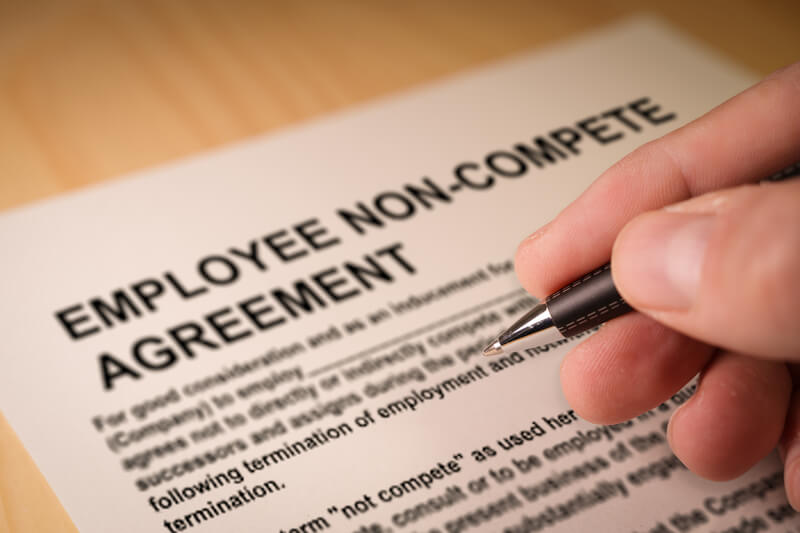According to The Balance, most Americans will have an average of twelve jobs in their lifetime. But what can citizens do when their employer limits their career options when they decide to leave?
Unfortunately, a non-compete agreement can stymie your opportunities for advancement. They have become so controversial that state and federal legislators have tried to make them illegal.
Do you need help getting out of a non-compete clause causing harm to your financial future? Then consider the legal options below that others have used to move on with their careers. Or, request a consultation with a local attorney today.
What Is a Non-Compete Agreement and How Does It Work?
Generally, a non-compete agreement is a document you sign at the start of your employment. While the details vary, the overall effect is you agree not to work for a competitor if you leave the company.
There is no universal template for these contracts. But the elements most non-compete agreements include are:
- A list of direct competitors
- The scope of work you cannot do for others
- A geographical area where you cannot work
- Damages you have to pay for violating the contract
- The duration of the prohibition against taking a job with a competitor
Typically, the organizations that ask you to sign this contract want to protect trade secrets or client lists. But committing yourself to limit your future job prospects also seems unreasonable.
These conflicting elements of non-compete agreements beg an answer to a crucial question. How do companies try to enforce them?
If a company feels you hurt their business by working for someone else, they may sue you for damages. However, this immediate escalation is not typical. Many companies will try to intimidate you by threatening civil action unless you meet their demands.
Are There Non-Compete Loopholes? Can You Get out of a Non-Compete Agreement?
Employment law is rife with loopholes for employers and employees. But they are only as effective as the state and federal laws that support them. Moreover, the local judiciary may skew heavily toward one interpretation over another.
Regardless of the challenges, many courts do not agree that employers can enforce these agreements. The tide of public opinion has swayed hard enough that even the FTC wants to ban them.
Another critical advantage for employees is that they may not need a loophole. Discrimination, retaliation, and other illegal practices can end a dispute over a non-compete in a hurry. Accordingly, you will find several strategies an employment lawyer can use to make this problem go away.
The Non-Compete Agreement Period Is Unreasonably Long
A company can go overboard with how long they expect you to stay out of their industry. Many agreements will stipulate six months to lessen the impact of losing someone. But any request for two years or more can constitute an unreasonable expectation.
Public Health Concerns
This exception to noncompete agreements typically applies to someone in the healthcare industry. For example, consider a situation where a hospital has a doctor sign this contract.
As reported by the American Medical Association, there is a substantial shortage of doctors in the United States. Furthermore, this problem looks like it will continue to get worse. Under these circumstances, there can be harm to public health by keeping a physician from practicing their trade. Consequently, a judge may throw out a non compete lawsuit because it is in everyone’s best interests.
Breach of Contract
The legal requirements for employment contracts go both ways. While your employer may be insistent about your compliance with an agreement, you have a right to do the same.
Any inconsistencies or broken promises in your onboarding documents can invalidate legal threats. For instance, imagine a situation where a company offers performance bonuses. If they do not deliver on this promise, they cannot use a noncompete agreement as a smokescreen for their breach of contract.
“Confidential Information” Is Public Knowledge
Companies often make the mistake of assigning too much value to their “proprietary information.” Arguably, the most relevant example would be among sales professionals. They may spend most of their days trying to qualify prospects and earn their business.
While they may generate an extensive database of clients and potential customers, so could anyone else. A company cannot claim exclusivity if anyone can find the prospects online.
Legitimate Interest to Enforce
A high threshold for employers to meet is to demonstrate they have legitimate business interests at risk. This condition likely does not apply to low-level employees. But some highly-paid individuals could hurt the company due to these factors:
- Knowledge of trade secrets
- Damaging relationships with prospects or existing customers
- Specialized, extraordinary, or expensive training
- Taking confidential and valuable contacts
- Loss of goodwill among clients of a professional practice
Wrongful Termination
Some states have taken the extra step to make non-compete agreements illegal. In addition, competitors that do not hire someone because they honor another organization’s contract can be a wrongful termination.
California is at the forefront of this type of legislation. In March 2022, Attorney General Bonta issued a statement to reiterate this law for the public. According to their research, 53% of the workers with a non-compete were hourly employees making less than $40,000 annually. This statistic demonstrates that many employers in the state went too far with these contracts, abusing employee rights in the workplace.
Do You Need an Employment Lawyer to Contest a Non-Compete Agreement?
A non-compete agreement is a power play by your employer. They want to control anything that has a remote possibility of hurting profits. Nonetheless, they do not get to control people as much as they would like to believe.
Are you ready to fight against a non-compete agreement that has hurt your career prospects? We have a broad and experienced network of employment lawyers that can help. Request a consultation with legal counsel through our website or call (866) 345-6784 today!

